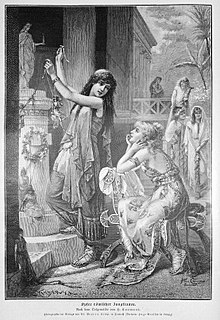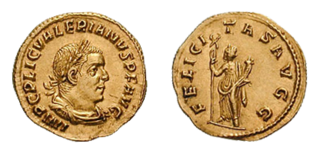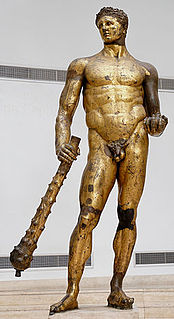Related Research Articles

Paganism is a term first used in the fourth century by early Christians for people in the Roman Empire who practiced polytheism. This was either because they were increasingly rural and provincial relative to the Christian population, or because they were not milites Christi. Alternate terms in Christian texts for the same group were hellene, gentile, and heathen. Ritual sacrifice was an integral part of ancient Graeco-Roman religion and was regarded as an indication of whether a person was pagan or Christian.

Venus is a Roman goddess, whose functions encompassed love, beauty, desire, sex, fertility, prosperity and victory. In Roman mythology, she was the ancestor of the Roman people through her son, Aeneas, who survived the fall of Troy and fled to Italy. Julius Caesar claimed her as his ancestor. Venus was central to many religious festivals, and was revered in Roman religion under numerous cult titles.

In ancient Roman religion, Ceres was a goddess of agriculture, grain crops, fertility and motherly relationships. She was originally the central deity in Rome's so-called plebeian or Aventine Triad, then was paired with her daughter Proserpina in what Romans described as "the Greek rites of Ceres". Her seven-day April festival of Cerealia included the popular Ludi Ceriales. She was also honoured in the May lustratio of the fields at the Ambarvalia festival, at harvest-time, and during Roman marriages and funeral rites.

In ancient Roman culture, felicitas is a condition of divinely inspired productivity, blessedness, or happiness. Felicitas could encompass both a woman's fertility and a general's luck or good fortune. The divine personification of Felicitas was cultivated as a goddess. Although felicitas may be translated as "good luck," and the goddess Felicitas shares some characteristics and attributes with Fortuna, the two were distinguished in Roman religion. Fortuna was unpredictable and her effects could be negative, as the existence of an altar to Mala Fortuna acknowledges. Felicitas, however, always had a positive significance. She appears with several epithets that focus on aspects of her divine power.

Pietas, translated variously as "duty", "religiosity" or "religious behavior", "loyalty", "devotion", or "filial piety", was one of the chief virtues among the ancient Romans. It was the distinguishing virtue of the founding hero Aeneas, who is often given the adjectival epithet pius ("religious") throughout Virgil's epic Aeneid. The sacred nature of pietas was embodied by the divine personification Pietas, a goddess often pictured on Roman coins. The Greek equivalent is eusebeia (εὐσέβεια).

Religion in ancient Rome includes the ancestral ethnic religion of the city of Rome that the Romans used to define themselves as a people, as well as the religious practices of peoples brought under Roman rule, in so far as they became widely followed in Rome and Italy. The Romans thought of themselves as highly religious, and attributed their success as a world power to their collective piety (pietas) in maintaining good relations with the gods. The Romans are known for the great number of deities they honored, a capacity that earned the mockery of early Christian polemicists.

Apotheosis is the glorification of a subject to divine level and most commonly, the treatment of a human like a god. The term has meanings in theology, where it refers to a belief, and in art, where it refers to a genre.

In ancient Roman religion, Concordia is the goddess who embodies agreement in marriage and society. Her Greek equivalent is usually regarded as Harmonia, with musical harmony a metaphor for an ideal of social concord or entente in the political discourse of the Republican era. She was thus often associated with Pax ("Peace") in representing a stable society. As such, she is more closely related to the Greek concept of homonoia (likemindedness), which was also represented by a goddess.

Thomas William Harpur (1929–2017), known as Tom Harpur, was a Canadian biblical scholar, columnist, and broadcaster. An ordained Anglican priest, he was a proponent of the Christ myth theory, the idea that Jesus did not exist but is a fictional or mythological figure. He was the author of a number of books, including For Christ's Sake (1986), Life after Death (1996), The Pagan Christ (2004), and Born Again.

In ancient Roman religion, a votum, plural vota, is a vow or promise made to a deity. The word comes from the past participle of the Latin verb voveo, vovere, "vow, promise". As the result of this verbal action, a votum is also that which fulfills a vow, that is, the thing promised, such as offerings, a statue, or even a temple building. The votum is thus an aspect of the contractual nature of Roman religion, a bargaining expressed by do ut des, "I give that you might give."

Lares were guardian deities in ancient Roman religion. Their origin is uncertain; they may have been hero-ancestors, guardians of the hearth, fields, boundaries, or fruitfulness, or an amalgamation of these.

Ultio ("Vengeance") was an ancient Roman goddess whose cultus was associated with Mars. An altar and golden statue of Ultio were set up in the Temple of Mars Ultor, dedicated by Augustus in 2 BC as a center for cultivating Mars the Avenger.
Gaius Junius Bubulcus Brutus was a Roman general and statesman, he was elected consul of the Roman Republic thrice, he was also appointed dictator or magister equitum thrice, and censor in 307 BC. In 311, he made a vow to the goddess Salus that he went on to fulfill, becoming the first plebeian to build a temple. The temple was one of the first dedicated to an abstract deity, and Junius was one of the first generals to vow a temple and then oversee its establishment through the construction and dedication process.

Roman mythology is the body of traditional stories pertaining to ancient Rome's legendary origins and religious system, as represented in the literature and visual arts of the Romans. "Roman mythology" may also refer to the modern study of these representations, and to the subject matter as represented in the literature and art of other cultures in any period.

Francesca Stavrakopoulou is a British biblical scholar and broadcaster. She is currently Professor of Hebrew Bible and Ancient Religion at the University of Exeter. The main focus of her research is on the Hebrew Bible, and on Israelite and Judahite history and religion.

In ancient Roman religion and myth, Hercules was venerated as a divinized hero and incorporated into the legends of Rome's founding. The Romans adapted Greek myths and the iconography of Heracles into their own literature and art, but the hero developed distinctly Roman characteristics. Some Greek sources as early as the 6th and 5th century BC gave Heracles Roman connections during his famous labors.

Fortuna Huiusce Diei was an aspect of the goddess Fortuna, known primarily for her temple in the Area Sacra di Largo Argentina at Rome. Cicero lists her among the deities who should be cultivated in his ideal state, because "she empowers each day". She thus embodies an important aspect of time as it figures in Roman religion: every day of the year had a distinct and potent nature, which the public priests were responsible for knowing and aligning the community with by means of the religious calendar.

Kate Cooper is a Professor of History and Head of the History Department at Royal Holloway, University of London, a role to which she was appointed in September 2017. She was previously Professor of Ancient History and Head of the Department of Classics and Ancient History at the University of Manchester, where she taught from 1995.
References
- 1 2 "Dr Anna Clark". Christ Church. Retrieved 13 January 2016.
- ↑ "Divine Qualities - Anna J. Clark". Oxford University Press. Retrieved 13 January 2016.
- ↑ Santangelo, Federico (18 April 2008). "Divine Qualities. Cult and Community in Republican Rome review". Bryn Mawr Classical Review . ISSN 1055-7660 . Retrieved 13 January 2016.